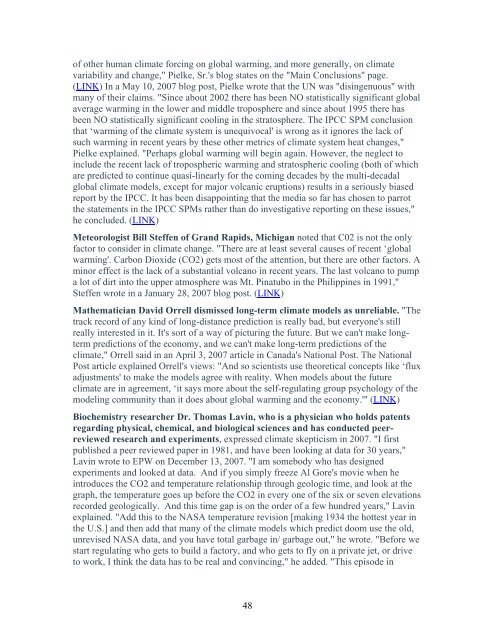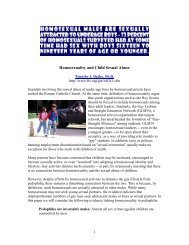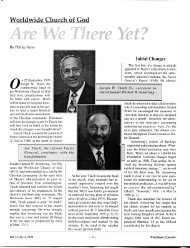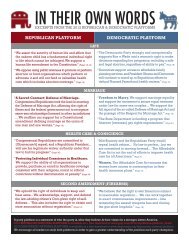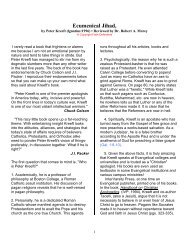U.S. Senate Report: Over 400 Prominent Scientists Disputed ... - NJIAT
U.S. Senate Report: Over 400 Prominent Scientists Disputed ... - NJIAT
U.S. Senate Report: Over 400 Prominent Scientists Disputed ... - NJIAT
Create successful ePaper yourself
Turn your PDF publications into a flip-book with our unique Google optimized e-Paper software.
of other human climate forcing on global warming, and more generally, on climate<br />
variability and change," Pielke, Sr.'s blog states on the "Main Conclusions" page.<br />
(LINK) In a May 10, 2007 blog post, Pielke wrote that the UN was "disingenuous" with<br />
many of their claims. "Since about 2002 there has been NO statistically significant global<br />
average warming in the lower and middle troposphere and since about 1995 there has<br />
been NO statistically significant cooling in the stratosphere. The IPCC SPM conclusion<br />
that ‘warming of the climate system is unequivocal' is wrong as it ignores the lack of<br />
such warming in recent years by these other metrics of climate system heat changes,"<br />
Pielke explained. "Perhaps global warming will begin again. However, the neglect to<br />
include the recent lack of tropospheric warming and stratospheric cooling (both of which<br />
are predicted to continue quasi-linearly for the coming decades by the multi-decadal<br />
global climate models, except for major volcanic eruptions) results in a seriously biased<br />
report by the IPCC. It has been disappointing that the media so far has chosen to parrot<br />
the statements in the IPCC SPMs rather than do investigative reporting on these issues,"<br />
he concluded. (LINK)<br />
Meteorologist Bill Steffen of Grand Rapids, Michigan noted that C02 is not the only<br />
factor to consider in climate change. "There are at least several causes of recent ‘global<br />
warming'. Carbon Dioxide (CO2) gets most of the attention, but there are other factors. A<br />
minor effect is the lack of a substantial volcano in recent years. The last volcano to pump<br />
a lot of dirt into the upper atmosphere was Mt. Pinatubo in the Philippines in 1991,"<br />
Steffen wrote in a January 28, 2007 blog post. (LINK)<br />
Mathematician David Orrell dismissed long-term climate models as unreliable. "The<br />
track record of any kind of long-distance prediction is really bad, but everyone's still<br />
really interested in it. It's sort of a way of picturing the future. But we can't make longterm<br />
predictions of the economy, and we can't make long-term predictions of the<br />
climate," Orrell said in an April 3, 2007 article in Canada's National Post. The National<br />
Post article explained Orrell's views: "And so scientists use theoretical concepts like ‘flux<br />
adjustments' to make the models agree with reality. When models about the future<br />
climate are in agreement, ‘it says more about the self-regulating group psychology of the<br />
modeling community than it does about global warming and the economy.'" (LINK)<br />
Biochemistry researcher Dr. Thomas Lavin, who is a physician who holds patents<br />
regarding physical, chemical, and biological sciences and has conducted peerreviewed<br />
research and experiments, expressed climate skepticism in 2007. "I first<br />
published a peer reviewed paper in 1981, and have been looking at data for 30 years,"<br />
Lavin wrote to EPW on December 13, 2007. "I am somebody who has designed<br />
experiments and looked at data. And if you simply freeze Al Gore's movie when he<br />
introduces the CO2 and temperature relationship through geologic time, and look at the<br />
graph, the temperature goes up before the CO2 in every one of the six or seven elevations<br />
recorded geologically. And this time gap is on the order of a few hundred years," Lavin<br />
explained. "Add this to the NASA temperature revision [making 1934 the hottest year in<br />
the U.S.] and then add that many of the climate models which predict doom use the old,<br />
unrevised NASA data, and you have total garbage in/ garbage out," he wrote. "Before we<br />
start regulating who gets to build a factory, and who gets to fly on a private jet, or drive<br />
to work, I think the data has to be real and convincing," he added. "This episode in<br />
48


